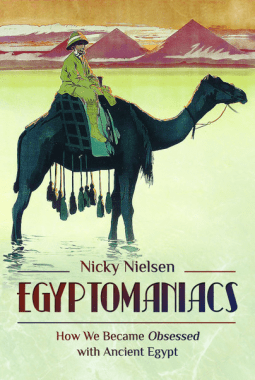For the longest time, I have enjoyed a fascination with Egypt. It may have started as a child, hearing Bible songs about asking Pharaoh to let the People go! Pyramids and camels may added to the appeal! Ancient Egypt is a mystical period in history full of unknowns and unreadable language. My love of art history and English filled me in on the confusing Roman and Persian periods with the Greeks mixed in! And then I discovered murder mystery novels set at the rise of British interest in Egypt and my love of Egypt-orientated works was fixed! Egyptomaniacs by Dr. Nicky Nielsen doesn’t disappoint and is a welcomed addition to my collection! It is full of amazing facts, hysterical myths and deep reflections on the job of work of modern Egyptologists have to do! I read it straight through!
The book sets out to “…chart this fascination from the sources of the ancient Egyptians themselves, to the writings of Greek and Roman authors, Arabic scholars and European travellers. It will examine popular tropes and misconceptions about ancient Egypt, many of which are still in vogue today, and identify their antecedents.“ and delivers on this and then some! It is broken into two parts.
Part one focuses on the history of ancient Egypt and how it has been perceived, pursued and reflected at different points in time. I loved the examination of the artistic representations in particular, it is so relevant to the current discussion on how we reflect diversity without prejudice. Whilst a serious discussion, the ironic tone at points had me laughing! I shan’t soon forget what I learnt!
Part two looks at modern day myths that have arisen around ancient Egypt and how they have been incorporated into pop culture. Dr Nicky Nielsen sums up the part for me with this quote:
“Fundamentally, it comes down to communication. If the scholarly community does not produce and make available good, scientific knowledge in a form and medium that is understandable, engaging and on platforms people enjoy engaging with, some will turn instead to the far bettermarketed pseudoscientific theories for explanation.”
From “Egyptomaniacs” by Dr. Nicky Nielsen
It is applicable far beyond Egyptology and is so insightful as to how humans process story and facts. Reflections on the exclusion of the advances made in Egyptology by those in the East as well as the modern politics and perceptions of Egypt were delightful surprises.
Perhaps it is my perchance for Egypt or perhaps it’s the engaging writing but all in all, I loved this book! It is a five out of five on the enJOYment scale and highly recommended!
* A word of warning to my friends: I may spurt unexpected, interesting to me, Egyptian facts at anytime in our future conversations! I learnt far too much not to share!

From the back cover:
The Greek historian Hecataeus of Abdera declared during the 4th century BCE that the Egyptian civilization was unsurpassed in the arts and in good governance, surpassing even that of the Greeks. During the Renaissance, several ecclesiastical nobles, including the Borgia Pope Alexander VI claimed their descent from the Egyptian god Osiris. In the 1920s, the discovery of Tutankhamun’s tomb in the Valley of the Kings prompted one of the first true media frenzies in history. For thousands of years, the Pharaonic culture has been a source of almost endless fascination and obsession. But to what extent is the popular view of ancient Egypt at all accurate? In Pyramidiots: How We Became Obsessed With Ancient Egypt, Egyptologist Dr Nicky Nielsen examines the popular view of Egypt as an exotic, esoteric, mystical culture obsessed with death and overflowing with mummies and pyramids. The book traces our obsession with ancient Egypt throughout history and methodically investigates, explains and strips away some of the most popular misconceptions about the Pharaohs and their civilization.
I received a complimentary copy of the book from Pen & Sword through NetGalley. Opinions expressed in this review are completely my own.

